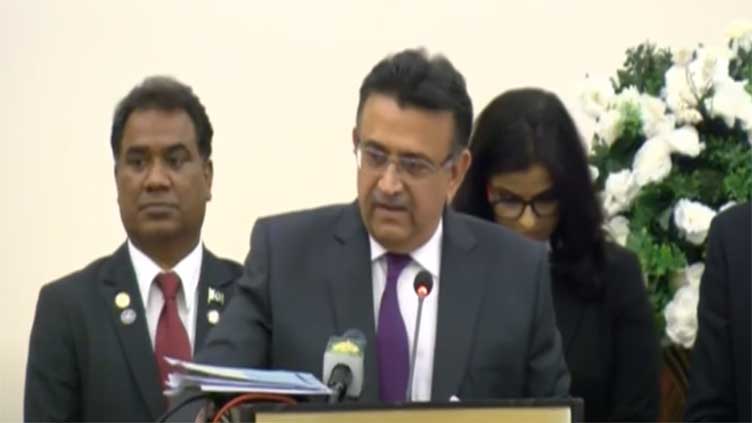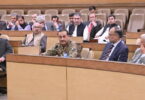ISLAMABAD (NNI): Chief Justice of Pakistan (CJP) Justice Umar Ata Bandial said they are fulfilling their fundamental and moral responsibility to protect and implement the Constitution. Delivering his key speech to the gathering at a seminar titled “Rights for minorities in constitution of Pakistan,” in Lahore Sunday, the CJP said running away from truth means running away from justice so it is a moral obligation to deal the cases on merit.
CJP Bandial said he was “optimistic” that the nation’s leaders, institutions and people were all “committed to the Constitution”. Chief Justice Bandial also spoke about the ongoing Punjab election case, stating that the court was not looking for excuses and was committed to following the constitution.
Referring to the negotiation process between the government and the PTI, he said the apex court was informed that they had not concluded yet.
“We have nothing to do with that but at least they are conscious that they have a duty to comply [with] the Constitution and we are there to support that effort otherwise our judgement is there, it has a force of its own, it may not be implemented today but it will last to the test of time and shall be implemented tomorrow,” the chief justice pointed out.
He said the rights of minorities in Pakistan are clear in the constitution. “Article 21 of the Constitution provides guarantees to the rights of minorities.” The CJP added that no discrimination against minorities will be tolerated. “The country’s Constitution allows everyone to lead lives in accordance with their religious freedom,” he said.
The apex court chief further said that a 5% quota has been kept for minorities in employment, which is being implemented. In Islam, there is no room for quarrels even on the basis of religion Respect for humanity and respect for each other’s religion needs to be kept in mind, he said.
Justice Umar said in Islam, there is no room for quarrels even on the basis of religion, adding that the protection of the rights of the minorities in every case should be ensured.
He reiterated judges of the apex court could not close their eyes if the Constitution mandated polls within 90 days of an assembly’s dissolution.
“When it comes to constitutional enforcement we must not blink our eyes. If it says 90 days for holding elections, [then] it is our duty to say that and not our choice, instead of finding a reason why we should avoid saying that.”
The chief justice said the matter was being called a “controversy”. The chief justice said the Supreme Court and its judges had no existence individually but “as a unit [and] as a constitutional organ and that is how we function”.
“The important thing is when the Supreme Court speaks on merit then its judgement has moral authority. That becomes even more important when those judgements are not appealed or no review is filed then which means no one has any objection to the judgement. “If a review is filed then it will be heard because no judgement is binding unless it becomes final. But if a judgement is not challenged then it becomes final so let’s see what happens now,” the chief justice said.
CJP Bandial said: “The implementation bench is always there so file an application and let’s see what happens.”
Justice Umar lamented that the country has been facing extremism for the last thirty years due to which at least 80,000 Pakistanis were killed.
He recalled that Justice Cornelius was a shining star in the history of Pakistan’s judiciary. “Justice Cornelius was an excellent and worthy man who joined the judiciary in 1930. Justice Cornelius served in the judiciary for 17 years. Justice Cornelius declared the order of Malik Ghulam Muhammad, the third governor-general of Pakistan illegal.
Turning his attention to Pakistan’s ongoing struggle with terrorism, the chief justice noted that the country had lost more than 80,000 lives in the war against terrorism.
Justice Cornelius was known for his landmark decisions, including declaring the dissolution of assemblies by the governor-general as illegal in 1955. He also played a key role in lifting the ban on the Jamaat-e-Islami (JI) in 1964.
Chief Justice Bandial emphasised the importance of resolving issues through dialogue and promoting knowledge as a means of developing the country. He reiterated that everyone was subject to the law, and when the truth was avoided, justice was avoided.







